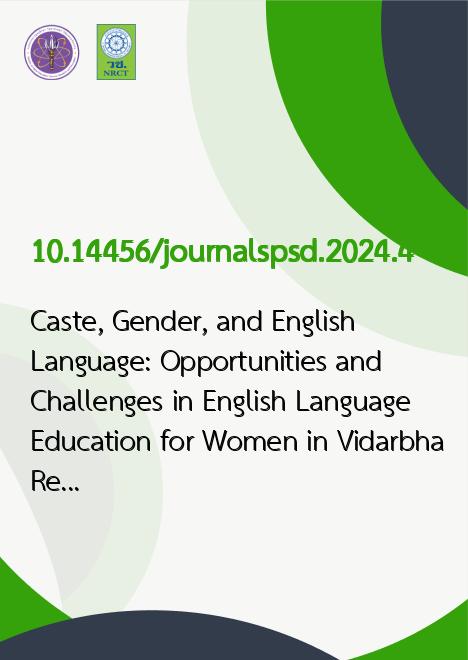
|
Caste, Gender, and English Language: Opportunities and Challenges in English Language Education for Women in Vidarbha Region, India |
|---|---|
| รหัสดีโอไอ | |
| Creator | Bharati Chaudhari |
| Title | Caste, Gender, and English Language: Opportunities and Challenges in English Language Education for Women in Vidarbha Region, India |
| Contributor | Raju Kendre |
| Publisher | Faculty of Social Administration, Thammasat University |
| Publication Year | 2567 |
| Journal Title | Journal of Social Policy, Social Change and Development |
| Journal Vol. | 2 |
| Journal No. | 2 |
| Page no. | 59-79 |
| Keyword | Vidarbha, Education, Gender, English language, First generation students |
| URL Website | https://so10.tci-thaijo.org/index.php/journalspsd/issue/view/179 |
| Website title | Journal of Social Policy, Social Change and Development |
| ISSN | 2985-0800 |
| Abstract | This paper draws inspiration from the teachings of social reformers Savitribai Phule, Mahatma Jyotiba Phule, and Dr. B. R. Ambedkar, exploring the complex relationship between women's educational achievements and the broader implications for community progress in India. It critically examines the enduring practice of socio-economic and political elites seeking to maintain their privileges through their English-speaking abilities. Instances include here families with sufficient means to enroll sons in English-language schools, relegating daughters to less privileged vernacular educational settings. This phenomenon reflects deeply ingrained patriarchal norms, perpetuating gender-based discrimination in educational opportunities. English, aside from its linguistic significance, assumes a crucial role in building confidence and dismantling ingrained inferiority complexes, further underscoring the urgency of equitable access to English-language education for women in Vidarbha. Since independence, access to the English language has proved particularly useful for marginalised sections of Indian society to empower themselves. Advocating for equitable English-language education aligns with Ambedkar's belief in its power to combat injustice and enable social mobility for marginalised groups. This paper's focus is to highlight socio-economic, gender, and regional disparities within an economically developed state in India, using the spread of English language education as a parameter to present the analysis |